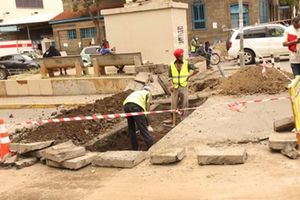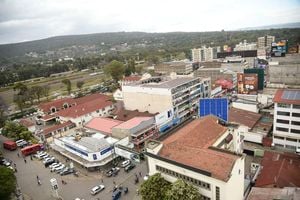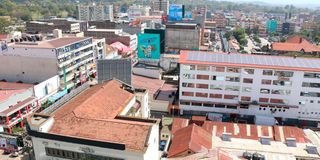
An aerial view of a section of Nakuru City on December 9, 2024.
Three years after earning its city charter, Nakuru is a place of contrasts where visible progress coexists with persistent challenges.
For locals, the journey since December 1, 2021, when former President Uhuru Kenyatta officially conferred city status on Nakuru, has been a mixture of optimism and concern. This has left residents divided on whether the glass is half-full or half-empty.
The Rift Valley capital has since experienced a whirlwind of transformations, from spruced-up streets and expanded investor presence to ambitious housing projects that signal a brighter future for its residents.
As Nakuru strives to live up to its "world-class city" aspirations, it, however, walks a fine line between progress and persistent hurdles.
Nakuru has also embarked on significant roadworks with several urban roads rehabilitated under the Kenya Urban Roads Authority (Kura).
The once-dilapidated Kenyatta Avenue now boasts smooth tarmac and functional drainage, much to the delight of business owners.
Nyayo Gardens
“I am proud of the developments that Nakuru city has attracted in three years. From infrastructural developments and street lighting, Nakuru has grown,” Mary Kimani, who owns a shop along Kenyatta Avenue, told the Nation.
“The drainage system on Kenyatta Avenue and other streets in the city has greatly improved. Also, the beautification of the legendary Nyayo Gardens has spruced up the face of Nakuru,” added Ms Kimani.
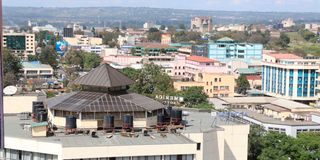
An aerial view of a section of Nakuru City on December 9, 2024.
Walkways worth over Sh100 million have also been added to key streets in Nakuru’s central business district including Moi Road, creating a more pedestrian-friendly environment.
“Any visitor to Nakuru is welcomed by the beautiful pedestrian walkways, flowers and trees along the streets. Nakuru is becoming one of the greenest cities in Kenya,” said James Mbuthia, a resident who praised the city's non-motorised transport programme for improving its aesthetics. This rapid growth has also attracted new investors.
Retail giants such as Cleanshelf and Naivas have expanded into Nakuru, taking over spaces vacated by Tuskys and Ukwala. This has intensified competition in the city’s retail sector, with Jamaa Supermarket being the latest to join in the fray.
"In the past three years many investors have flocked to Nakuru, providing employment and boosting the local economy," said John Ombati, another resident.
This influx of businesses including food chains like Chandarana and Pizza Inn signals a positive shift in Nakuru’s commercial landscape.
The construction of the Golden Life Mall — the largest in Nakuru — has also added to the city’s urban makeover. Located along the Nakuru-Eldoret highway, the mall stands as a testament to the growing confidence in Nakuru as an investment hub.
Chandarana is the anchor tenant at the prestigious ultra-modern Golden Life Mall, which is also the largest mall in Nakuru so far.
The mall, a project of the Egerton University Retirement Benefits Scheme, stands closely opposite another mall namely the Anglican Church of Kenya Imani.
With the two malls, Nakuru CBD seems to be quickly extending west, along the Nakuru-Eldoret highway.
Banks and saccos have also not been left behind, Faulu Microfinance Bank relocated to a bigger space in the CBD with UBA, GT Bank, Tower and UNISON Saccos making their presence felt in the city.
Kenyatta Avenue
Faulu Microfinance Bank, a subsidiary of the UAP Old Mutual Group in East Africa, opened a branch in Nakuru at Kenyatta Avenue a year ago, to boost Small and Medium Enterprises (SMEs) in the region.
However, not all has been smooth sailing.
Areas like Bondeni and Kivumbini, which have long been associated with criminal activity and substandard living conditions remain a stark contrast to the growing urban developments.
The overcrowded areas of Lake View, Kaloleni, Ojuka, Shauri Yako, Flamingo, Kimathi and Pangani — where homes built over seven decades ago — still stand, but are slowly beginning to change.
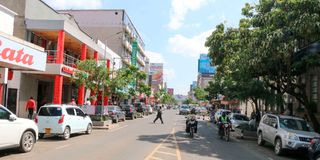
Kenyatta Avenue, the main street of Nakuru City on December 9, 2024.
The national government has invested Sh2 billion in building 605 affordable homes in these areas, aiming to alleviate overcrowding and improve the quality of life for residents.
The construction of a Sh600 million ultramodern market and a new matatu and bus terminus in the neighbourhood also promises to boost local development and provide job opportunities for the youth.
"For a long period, Bondeni has been synonymous with crime and gang activity, but these changes are already improving the area," said Charles Onyango, a resident of Bondeni.
In the face of these improvements, however, urban planners and residents agree that there is still much to be done.
Urban planning expert Paul Tumbo points out that the city’s growth demands a more cohesive urban plan.
“Nakuru’s city management should contract planners to redesign the city to help decongest it and improve its overall layout,” he said.
Many locals are grappling with the burden of higher land rates, a direct consequence of Nakuru’s elevation to city status.
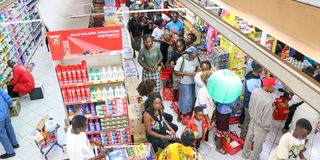
Shoppers queue at Gilani's Supermarket in Nakuru City on December 23, 2024, ahead of Christmas and New Year celebrations.
“Landowners are paying significantly more in rates, yet with the shrinking economy, it feels like an extra strain,” says Joseph Karanja, a landlord in Free Area.
This financial pressure has been particularly difficult for middle and low-income earners, forcing some to consider selling their properties or increasing rent to cover the costs.
The controversial decision by Governor Susan Kihika’s government to allow matatus back into the CBD has also sparked debate.
While it may help businesses by offering easy access it has also created new traffic problems.
Residents are also calling for improved services to match Nakuru’s new city status.
“We need better water supply, garbage disposal systems and improved roads and infrastructure,” said Daniel Kimani, a governance expert.
Pressing challenges
These issues are particularly pressing as the city’s population continues to rise, now at about 400,000, up from 367,183 in the 2019 census.
Clean water supply remains one of Nakuru’s most pressing challenges. The city’s rapid population growth and increased demand for industrial water have placed significant pressure on existing systems. Furthermore, the city's sewerage infrastructure, which currently serves only 30 per cent of Nakuru, is struggling to keep up.
Expansion of the sewerage system is essential to meet the needs of new residents and prevent health issues such as cholera and other waterborne diseases.
The city’s authorities are aware of these gaps and have been working on solutions.
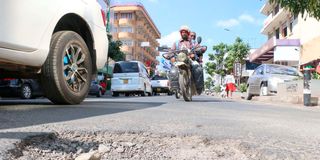
Motorists manoeuvre around a pothole on Kenyatta Avenue in Nakuru City on December 9, 2024.
A Sh5.6 billion project funded by the Germany Development Bank (KfW) aims to address water supply and sewerage system challenges, along with improving wastewater treatment.
Governor Kihika announced that the project will focus on increasing water supply through new boreholes, rehabilitation of water supply networks and construction of new water reservoirs.
The construction of modern sewerage systems is also underway in Nakuru’s oldest informal settlement areas, including Flamingo, Kivumbini, and Kimathi estates. These areas, long plagued by poor sanitation, are expected to benefit greatly from these upgrades.
Another challenge has been the shortage of burial space.
Both Nakuru North and Nakuru South cemeteries were declared full years ago and the issue has recently become more urgent.
Last week, the city faced a controversy over "recycling" graves at the Nakuru South Cemetery, as authorities struggled to find new burial space.
“There is a looming problem in Nakuru over cemetery space. The county government should move swiftly to acquire new land for a cemetery to avoid a crisis,” said David Kuria, a resident.
New streetlights
Despite the grave concerns over infrastructure and urban services, the city’s efforts to address crime have shown positive results.
New streetlights and CCTV cameras have been installed in key areas of Nakuru, including the CBD in a bid to deter crime and promote a 24-hour economy.
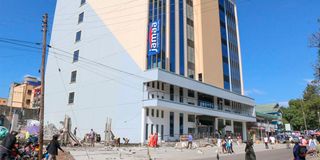
A building under construction in Nakuru City' Kenyatta Avenue on December 9, 2024. It will house Jamaa Supermarket upon completion.
City manager Gitau Thabanja explained in an interview with Nation.Africa that CCTV installation was part of a broader strategy to ensure safety in the city.
“Initially muggers and robbers operated boldly undeterred, but now with CCTV cameras and a sufficient number of security agents, crime within the CBD has reduced,” he said.
In addition to crime prevention, the city's new streetlights will enhance security and support businesses operating after hours.
Governor Kihika has also expressed her administration’s commitment to improving street lighting across Nakuru and addressing vandalism that has disrupted the city’s lighting network.
Despite these challenges, Nakuru’s city status has brought undeniable economic growth.
New industries and businesses have created jobs, attracting young professionals from neighbouring counties. Retail and hospitality sectors, in particular, have seen a boom.
Already the city’s skyline has changed in the past years with modern buildings including the 14-floor Tower One building in downtown Nakuru, Highway Towers, Shoppers Paradise, West Side Mall and Naivas Mall among other new high-rise buildings teaming up, to change the face of the city.
The rusty roofs of old colonial buildings that once dotted Nakuru town are quickly fading away.
Hotels like the Sarova Woodland Hotel, the Alps, Ole Ken and Legacy and institutions like Mount Kenya University have come up in Nakuru, ready to reap from the windfall that comes with city status.
Mount Kenya University’s modern building that houses its Nakuru campus stands tall on the Western side of the city.


